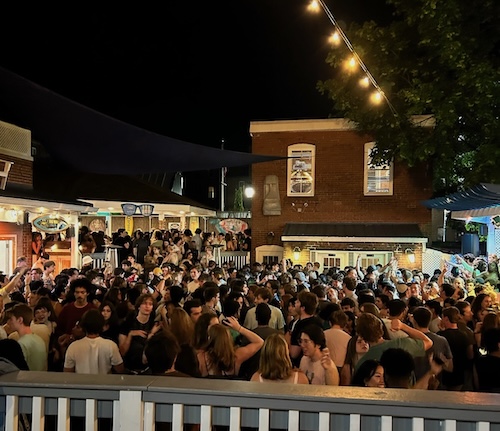In my first semester of sophomore year, I took a class called ritual with Prof. Justine Quijada. Cross listed with Anthropology and Religion, it used religious theories to analyze rituals, and connected what happened within those rituals to how society functions. Professor Quijada is one of the only practicing anthropologists at Wesleyan, and routinely goes to Buryatia, an ethnically-Mongolian region of Russia that has been the victim of much religious oppression throughout the Soviet era and modern-day.
We were tasked to find a ritual on campus, something that happens at least once every two weeks, and go and observe, engaging in participant observation. I chose Wesleyan’s weekly bar night, a tradition where literal hundreds of Wesleyan students will migrate to Mezzos Bar and Grille, a combo bar / event space. It is a social event, and some at Wesleyan describe it as “the best part of the week, every week.” I attended some 7 times, with my notebook in hand. My notes are attached here: occasionally drunken, always observant.
It was the first true ethnographic research project I engaged in, and I vehemently enjoyed it. Much of what it involved was collecting stories, perspectives on the event from friends and people I interacted with while there. The bolded quotes are things that I felt were important, and that ended up in my essay. One of the most interesting parts of the project was how people would come up to me, take my notebook, and write something from “my” perspective, e.g. “[blank] is beautiful and dancing on the dance floor and everyone wants to be them.” A big part of this is that bar night is about performance; it’s often treated as a place to meet people! Most parties at Wesleyan are determined by some sort of social standing; there’s either a guest list, a “need-to-know” basis or it’s a frat house. Bar night is the only place where there aren’t any social barriers to entry; therefore, it’s, in a sense, ‘liberated’ from the social structures of Wesleyan. Since there aren’t those same social barriers at Mezzo Grill, people are able to connect easier, and, often, hook up easier. My presence at the , as the defined “anthropological observer,” meant that whatever performance people were trying to translate could be represented “ideally” in my notes; so, they took my notebook, and wrote their own.

The paper drew on three concepts from religious anthropology. Victor Turner’s communitas, or the intangible quality of connection present between individuals who participate in rituals alongside each other, was ever present at Bar Night. Another concept, developed by Prof. Quijada, was that of semiotic diversity – individuals going to a ritual for a diverse array of reasons, changing the ‘purpose’ of the ritual with their various interpretations and reasons for attending. As a result, rituals with this quality become more mainstream, a phenomenon I absolutely observed at bar night. The final is Saba Mahmoud’s concept of rehearsed spontaneity, a quality of rituals where individuals will act within a set of specific values, but are free to express themselves within those values during the ritual. The ritual is a site of personal molding, where how well the participants accord with the expected set of values is directly translated to how well they participate in the ritual.
Overall, this was an extremely enjoyable experience. It opened my mind to ethnographic observation as a research method, connected me with various other people on campus that I wouldn’t have typically connected with, and learned about how Wesleyan’s social structure is impacted by the rituals embedded in nightlife. I continue to use ethnography and participant observation as research tools, largely inspired by this experience.
You can read the paper here:
Leave a Reply